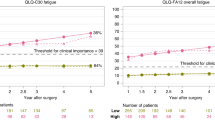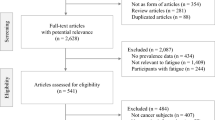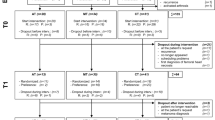Abstract
Cancer patients undergoing radiotherapy frequently report fatigue. However, knowledge of the importance of fatigue for these patients and of the factors associated with their fatigue is limited. The aim of the current investigation was to gain more insight into fatigue as related to radiotherapy by answering the following questions. First, how is the experience of fatigue best described? Secondly, to what extent is fatigue related to sociodemographic, medical (including treatment), physical and psychological factors? Finally, is it possible to predict which patients will suffer from fatigue after completion of radiotherapy? Patients with different types of cancer receiving radiotherapy with curative intent (n = 250) were interviewed before and within 2 weeks of completion of radiotherapy. During treatment, patients rated their fatigue at 2-weekly intervals. Results indicate a gradual increase in fatigue over the period of radiotherapy and a decrease after completion of treatment. Fatigue scores obtained after radiotherapy were only slightly, although significantly, higher than pretreatment scores. After treatment, 46% of the patients reported fatigue among the three symptoms that caused them most distress. Significant associations were found between post-treatment fatigue and diagnosis, physical distress, functional disability, quality of sleep, psychological distress and depression. No association was found between fatigue and treatment or personality characteristics. Multivariate regression analysis demonstrated that the intensity of pretreatment fatigue was the best predictor of fatigue after treatment. In view of this finding, a regression analysis was performed to gain more insight into the variables predicting pretreatment fatigue. The degree of functional disability and impaired quality of sleep were found to explain 38% of the variance in fatigue before starting radiotherapy. Fatigue in disease-free patients 9 months after treatment is described in paper (B) in this issue.
This is a preview of subscription content, access via your institution
Access options
Subscribe to this journal
Receive 24 print issues and online access
$259.00 per year
only $10.79 per issue
Buy this article
- Purchase on Springer Link
- Instant access to full article PDF
Prices may be subject to local taxes which are calculated during checkout
Similar content being viewed by others
Author information
Authors and Affiliations
Rights and permissions
About this article
Cite this article
Smets, E., Visser, M., Willems-Groot, A. et al. Fatigue and radiotherapy: (A) experience in patients undergoing treatment. Br J Cancer 78, 899–906 (1998). https://doi.org/10.1038/bjc.1998.599
Issue Date:
DOI: https://doi.org/10.1038/bjc.1998.599
This article is cited by
-
Musashi expression in intestinal stem cells attenuates radiation-induced decline in intestinal permeability and survival in Drosophila
Scientific Reports (2020)
-
Patient-reported acute fatigue in elderly breast cancer patients treated with and without regional nodal radiation
Breast Cancer Research and Treatment (2020)
-
Instruments for determining clinically relevant fatigue in breast cancer patients during radiotherapy
Breast Cancer (2020)
-
Effects of aerobic exercise on cancer-related fatigue in breast cancer patients receiving chemotherapy: a meta-analysis
Tumor Biology (2014)
-
Fatigue in advanced cancer patients attending an outpatient palliative radiotherapy clinic as screened by the Edmonton Symptom Assessment System
Supportive Care in Cancer (2012)



